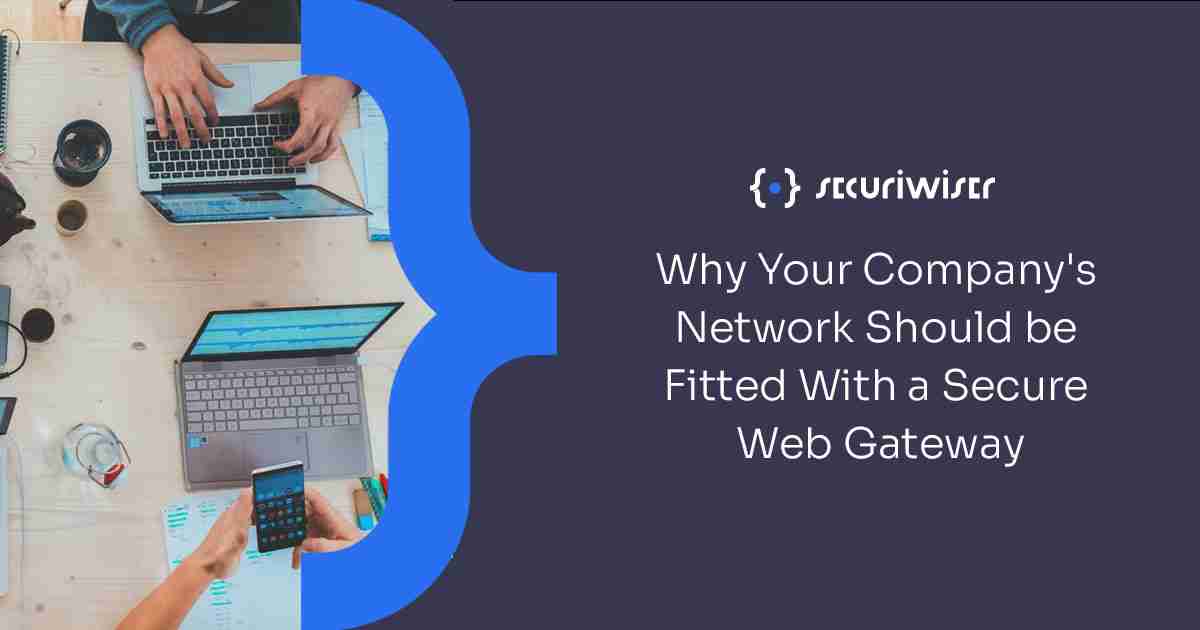Why Your Company’s Network Should be Fitted With a Secure Web Gateway
Blog / Why Your Company’s Network Should be Fitted With a Secure Web Gateway
3 MIN READ


What is a Secure Web Gateway?
A secure web gateway (SWG) functions as a cyberbarrier to prevent unauthorised web data from entering a company’s system. Instead of a user being directed to a website in a straightforward manner, the user connects to the SWG which then directs the user to an authorised website.
A secure web gateway provides protection against maliciously coded websites and malware from accessing the organisation’s data or infecting a company’s system. A secure web gateway permits authorised users to access secure websites. Further services provided by SWGs include prevention of copyrighted material, sensitive data and confidential documents being exfiltrated.
Importance of Secure Web Gateway
Methods used by cybercriminals to embed potentially malicious material into legitimate looking websites have been increasingly refined. If these fabricated websites are visited by an unknowing employee, the consequences upon the company can be large scale, for example the enabling of a malicious code being executed onto the company’s network or granted unauthorised access to the criminal.
Some websites simply need a connection to bypass web browser control and introduce malware into the targeted network. To reduce the risk of a company being affected in this manner, SWGs can be installed to block access to these sites as well as prevent data from being exfiltrated by malicious actors.
How do they work?
Secure web gateways can be established by installing a software component or as a hardware appliance on the edge of a network or at user endpoints. All transmissions between the users and the networks are filtered by the gateway extension which then decides if a transmission is malicious. The gateway also checks for attempts made by a non-user to create a URL connection.
The gateway monitors URLs alongside a list of approved website and blocks URLs that are not listed as approved and sites that are known to be malicious are blocked. Typically, whitelists and blacklists are stored and operated in the secure gateway’s database.
The application also enables companies to filter the data being sent out of the network, checking for and blocking distribution of restricted data in the network. Many organisations deploy a cloud based, software-as-a-service (SaaS) secure web gateways due to increased flexibility and decreased maintenance and installation costs.
Companies with existing hardware installations of SWGs commonly combine software installations, having in place the hardware version for larger, physical sites and software versions for remote locations and travelling employees.
Characteristics of secure web gateways
In addition to monitoring data traffic between users and the intended website, secure web gateways need to provide the ability to:
- Monitor of encrypted web traffic.
- Prevention data loss by scanning the sensitivity of the data before allowing it to be uploaded onto a website.
- Scan and filter traffic to and from social media.
- Enforce internet protocols including HTTP, HTTPS and FTP internet protocols. HTTPS is the most common however HTTP and FTP connections are still supported.
- Integrate with anti-malware to detect and prevent zero-day threats.
- Function alongside security monitoring to alert security administrators in the case of web gateway security issues.
- Select where the SWG is equipped into the network for example, the edge, the endpoints or in the cloud.
What Securiwiser can help you with
We aim to provide our clients advice concerning implementation of various specific cyber security methods, some of which will be more suitable than others depending on the business type to help ensure the cyber health of our client’s system.
We advise our clients (whether they are individual users or business owners) regarding various cyber threats that their businesses and operating systems may face. This includes increasing trends of certain threats and prevention methods that are cost effective and time saving.
Furthermore, business owners, employees and the general users may forget to conduct regular scans to monitor the health of their operating system, which criminals can take advantage of to gain unauthorised access by exploiting unrecognised, underlying vulnerabilities.
Securiwiser can conduct regular scans for your system and provide a detailed cybersecurity risk assessment and a cybersecurity vulnerability assessment. We can further explain detected vulnerabilities and risks in detail to our clients and provide the best course of action that will save your business time and money.
Previous Article
Cloud Security: Risks and CountermeasuresNext Article
Active Defence Strategies Against RansomwareHow secure is
your business?
Blog categories
How secure is
your business?